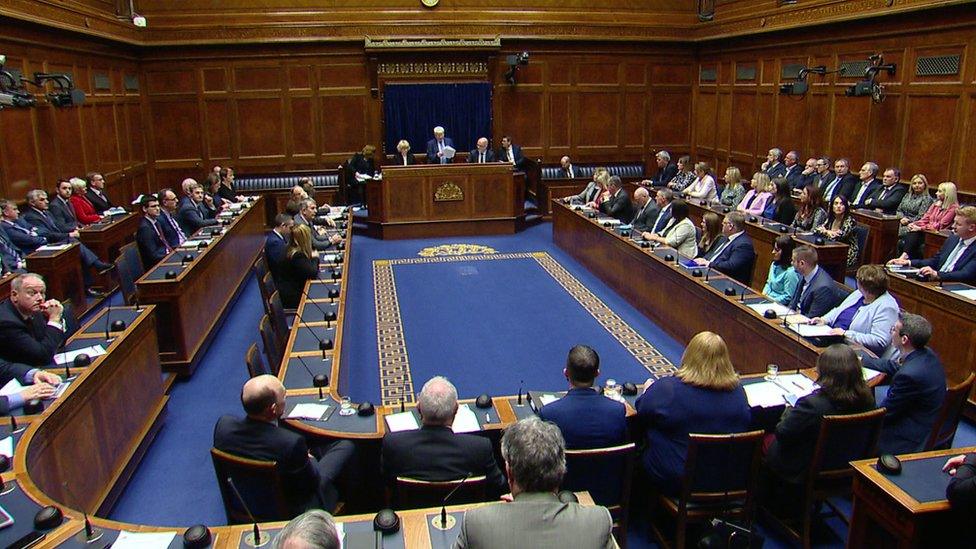Stormont deal: Unions to consider £30m Stormont pay offer
- Published
- comments
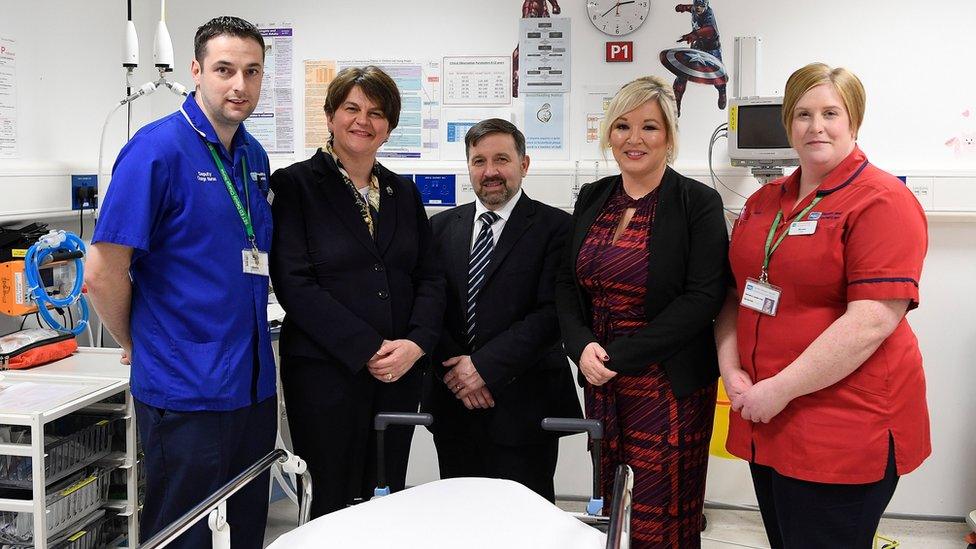
Arlene Foster, Robin Swann and Michelle O'Neill pictured alongside health workers on Tuesday
Health worker unions have said they will consider the pay offer made by Health Minister Robin Swann after a "very productive" meeting on Tuesday.
However, they have expressed concern the money is coming from Stormont's finances and not additional funding from Westminster.
Mr Swann told the assembly that pay parity for health workers can be restored thanks to an extra £30m.
He said a briefing with the unions had been "constructive".
They are expected to respond to the pay offer on Thursday.
Unions said Northern Ireland Secretary Julian Smith had previously indicated money to end the dispute would be provided by the government.
However, Mr Swann said that the money earmarked had not been the result of any additional finances offered to Northern Ireland by Westminster.
Health strike: Robin Swann confirms pay package for nurses and health workers
He also said that he recognised that a move to pay parity would have implications for the budget in future years.
Nurses and healthcare workers began industrial action over staffing levels and pay, which does not rise in line with healthcare workers in Scotland, England and Wales.
The minister said his department had already gathered together £79m to increase pay for health workers and give them the same wage as colleagues in England.
An extra £30m would now be pulled from existing finances at Stormont, he said.
Pat Cullen, director of the Royal College of Nursing (RCN), said this was "a surprise" as Northern Ireland Secretary Julian Smith had indicated "additional money would very much be made available from Westminster".
She added that if the money being used to end the dispute was "recycled" from other departments then "we're going to find ourselves in very much the same position moving forward".
"There's no doubt that additional funding is needed. We've had year after year of austerity and now it's time for Westminster to step up and bring the health service back from the collapse that it's in."
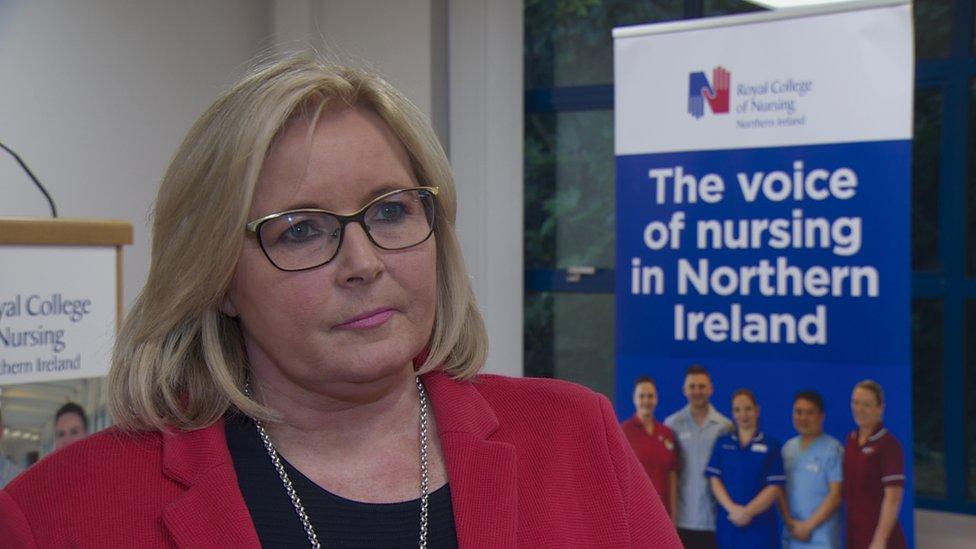
Ms Cullen described the meeting as "very productive"
Anne Speed, the health unions' lead negotiator, echoed those concerns.
"He (Mr Smith) told us the money was there, he told us it was new monies, so why shouldn't it be new monies?" she said.
"Why should the executive have to scrabble around to meet a commitment that he extracted?"
However, Ms Cullen added that Mr Swann made it "very clear" he is "totally committed to working with the trade unions".
She said he indicated he will issue letters confirming his commitment to safe staffing and pay parity.
"As I always say to our members nothing is concluded until I have those formal letters that I can put to them," she added.

Analysis
by Marie-Louise Connolly, BBC News NI Health Correspondent
While it's not all signed, sealed and delivered it looks like Robin Swann and the executive has secured a deal with the health workers.
Not bad for a first day in office - then again they've had three years off while health and social care staff held the fort.
While the unions have to sell the deal to their executives and still go through the finer detail, they are indicating that the strike action will be called off.
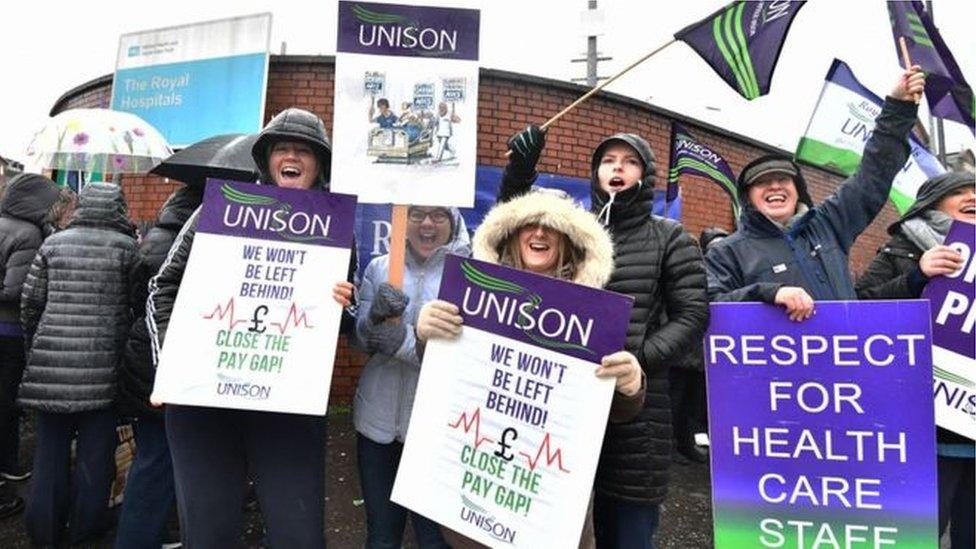
Unions have indicated the strike action will be called off
What perhaps is more surprising is that the money is coming from Northern Ireland's coffers and not from Westminster.
For the past number of weeks, workers were told pay negotiations depended on money contained in the financial package to be provided if power-sharing at Stormont was restored.
That wasn't the case. Robin Swann admitted himself that is concerning but what's even more concerning, he said, is getting staff back to work again.
The health crisis is far from over but today the executive took a big step to begin a long process of getting it back on its feet again.

Earlier, Finance Minister Conor Murphy said he recognised the updated pay offer was coming from within existing Stormont finances, but said it was not a case of "robbing peter to pay Paul".
He said as the executive had not yet been able to tie down funding commitments from the British government, they had "dipped into existing finances".
Allow X content?
This article contains content provided by X. We ask for your permission before anything is loaded, as they may be using cookies and other technologies. You may want to read X’s cookie policy, external and privacy policy, external before accepting. To view this content choose ‘accept and continue’.
The Northern Ireland Executive met earlier on Tuesday to discuss the government's offer of money to implement the Stormont deal.
Finance Minister Conor Murphy said that the proposed financial support was "way short" of what was expected.
He was speaking following a meeting between the Stormont parties and Secretary of State Julian Smith where the financial offer was made.
BBC News NI political correspondent Enda McClafferty said he understood that the financial package was £2bn.
Allow X content?
This article contains content provided by X. We ask for your permission before anything is loaded, as they may be using cookies and other technologies. You may want to read X’s cookie policy, external and privacy policy, external before accepting. To view this content choose ‘accept and continue’.
Earlier, the minister for education Peter Weir announced that 18 schools are to benefit from school building improvements worth around £45m in total.
The improvements are the latest to be funded under the school enhancement programme (SEP).
It provides for new school buildings worth between £500,000 and £4m.
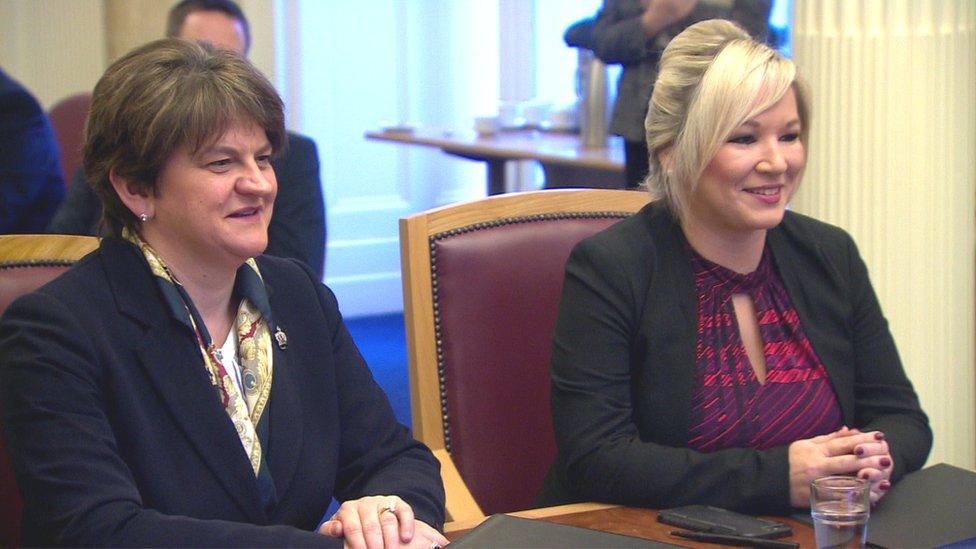
Arlene Foster and Michelle O'Neill at the table for Tuesday's meeting of the new executive
But on Monday the new finance minister said the government's proposal did not go far enough.
"We have to analyse the verbal figures that were given to us tonight by the secretary of state, but my initial read of them is they fall way short and I wouldn't tend to accept that," he said.
Earlier, the prime minister said the government had made "huge commitments" as part of the deal.
But he did not state how much money would be provided to support the deal, saying it was not about money but leadership.
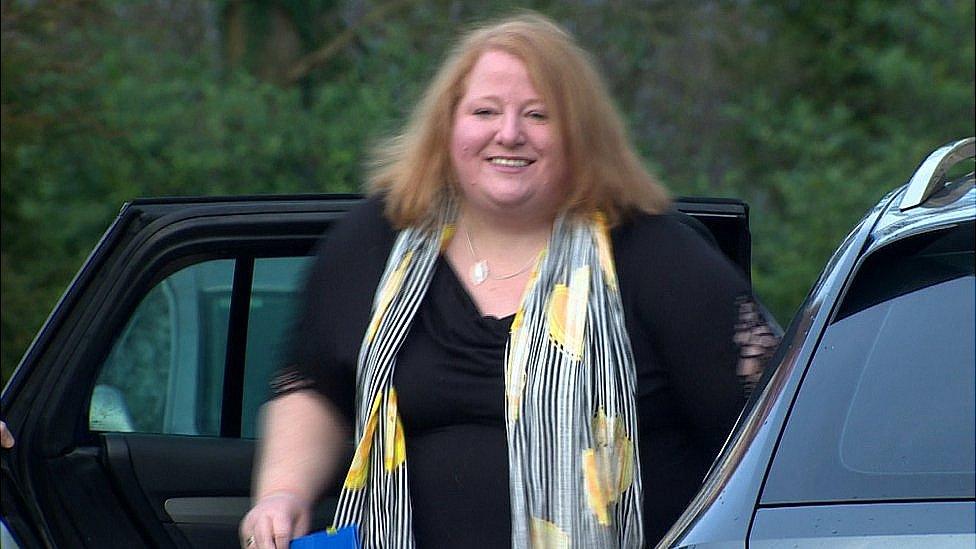
Justice Minister Naomi Long arrives for the executive meeting
Speaking after the executive meeting, First Minister Arlene Foster said there are "significant challenges ahead of us but equally we have a real opportunity".
"With strong leadership and collegiate working we will make sure that our public services are transformed," she added.
Deputy First Minister Michelle O'Neill said there the transformation would require "a coordinated, sustained approach to bring lasting, positive change".
- Published18 December 2019
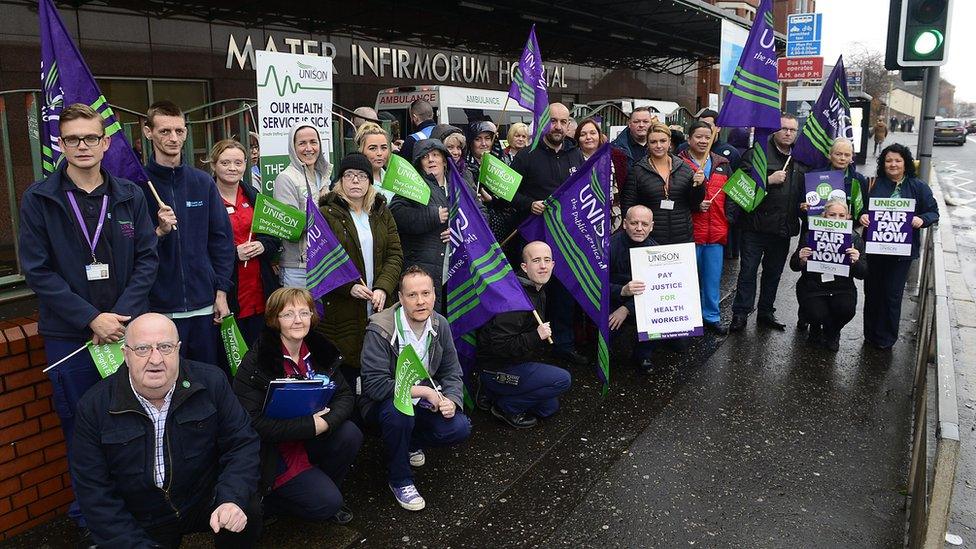
- Published17 December 2019
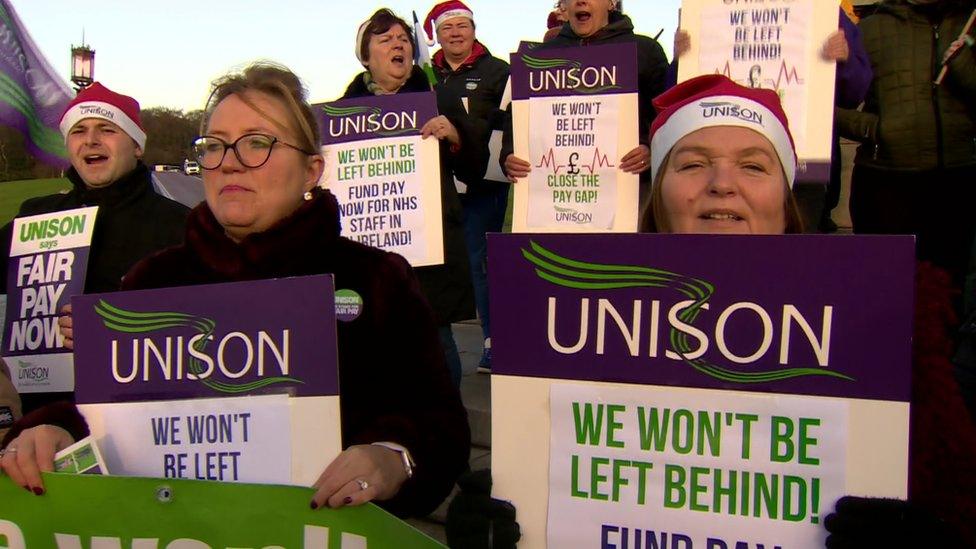
- Published10 January 2020
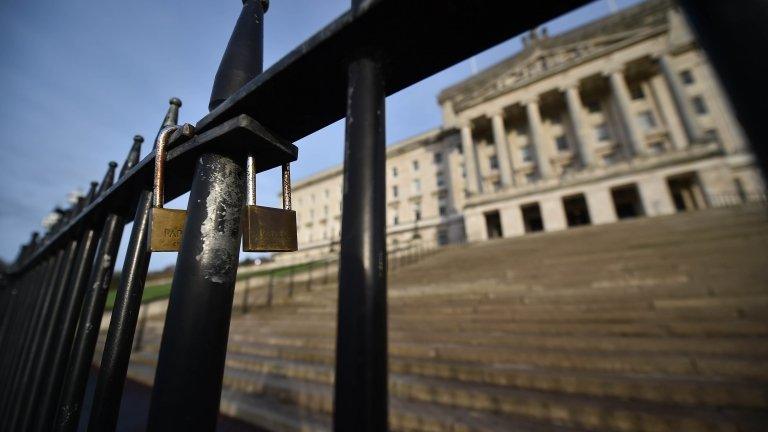
- Published12 January 2020
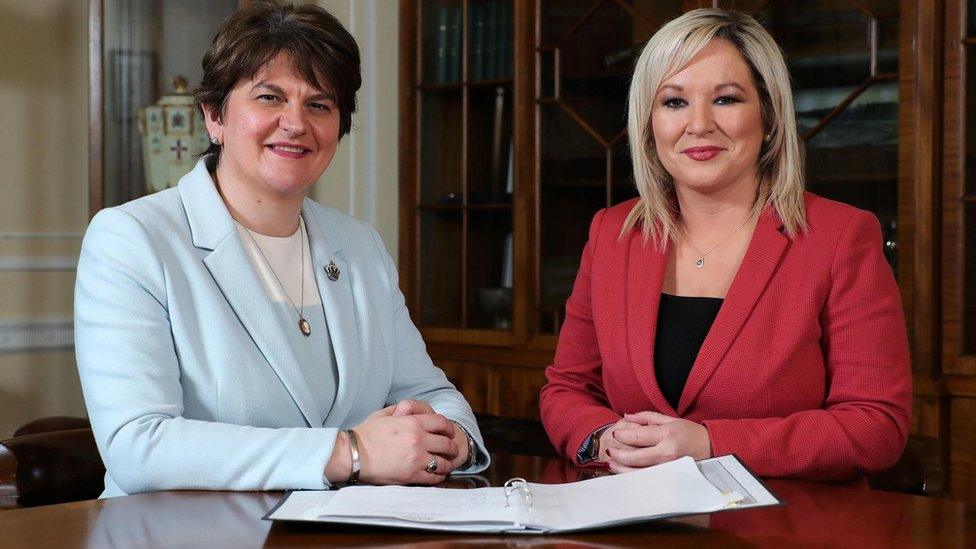
- Published11 January 2020
